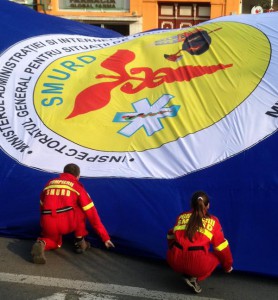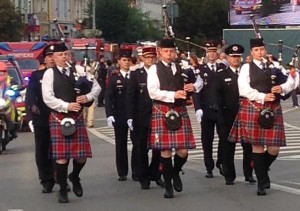30th September 2015
The Story of SMURD
SMURD might sound to the British ear like one of those evil syndicates aiming to take over the world in a sixties spy caper. Or possibly a new brand of detergent. But the acronym actually stands for “Serviciul Mobil de Urgenta, Reanimare si Descarcerare”. It is a Romanian mobile emergency service, which began life in the provincial city of Targu Mures in 1990, as the brainchild of Raed Arafat, a young Palestinian doctor working in the city.
From its Transylvanian beginnings it has spread across Romania; a joint venture involving hospital emergency departments, the fire service and the air rescue service of the Interior Ministry and with operational coordination with the ambulance service (the latter falling under the umbrella of the Health Ministry). I travelled to Targu Mures last week to commemorate the 25th anniversary of its establishment. The presence at the celebration of three pipers from the Scottish Fire and Rescue Service Pipe Band was but one indication of the strength of collaboration with the UK which has accompanied the development of the organisation.
Early support from the Royal Infirmary of Edinburgh included in 1993 the establishment of a resuscitation room in the hospital in Targu Mures, which, Raed Arafat told me, had the effect of reducing mortality rates in the reception area by 50% in one year. The success of the resuscitation room led Dr Arafat to raise his level of ambition, and he spoke with Keith Little of the Royal Infirmary about his desire for a full emergency department. The story of how in 1994 Targu Mures got one involved a BBC television programme called ‘Challenge Anneka’, whose bubbly presenter, Anneka Rice, accepted the challenge to move a modular building serving as an ophthalmology clinic from Dunfermline to Targu Mures. The effort involved 18 trucks and surmounted initial opposition from the Targu Mures hospital authorities, who queried the need for such a facility. The new emergency department was put up in the grounds of the hospital and operated with distinction until 2012. At this point, a building designed to take up to 40 patients a day was serving 150, and SMURD eventually secured the funding to construct a brand new emergency department.
But the building put up by the Challenge Anneka team still sees service. SMURD received a generous donation from the Vodafone Foundation, the corporate social arm of one of the major British companies operating in Romania, allowing the building to embark on a new life as a SMURD training centre, where its staff learn techniques ranging from ultrasound to vehicle extrications.

Extrication is indeed another area in which the Romanian organisation received great support from the UK. In a sense it was the Strathclyde Fire and Rescue Service who put the ‘D’ into SMURD: an organisation which had started life as SMUR added ‘descarcerare’ (extrication) in 1993 when Strathclyde donated the first specialised extraction equipment to the Mures Fire Brigade. It was used in action on the very day of its official ceremonial handover. Raed Arafat explained to me that Strathclyde Fire and Rescue Service had been a valued partner in particular because it had not simply donated used equipment, but had supported SMURD over an extended period through the provision of training and advice, allowing SMURD to develop experience in new fields such as handling chemical hazards. Strathclyde’s John Clenaghan was awarded the Romanian Order of Military Virtue by then Romanian President Traian Basescu in recognition of the role he played in supporting the modernisation of SMURD.
It is a real triumph for Dr Arafat personally and for the organisation that so much has been completed in 25 years. The event in Targu Mures was a celebration of that, as participants gathered to sing the newly minted SMURD anthem and to look forward to the further development of an organisation which plays a crucial role in Romania’s health system.
